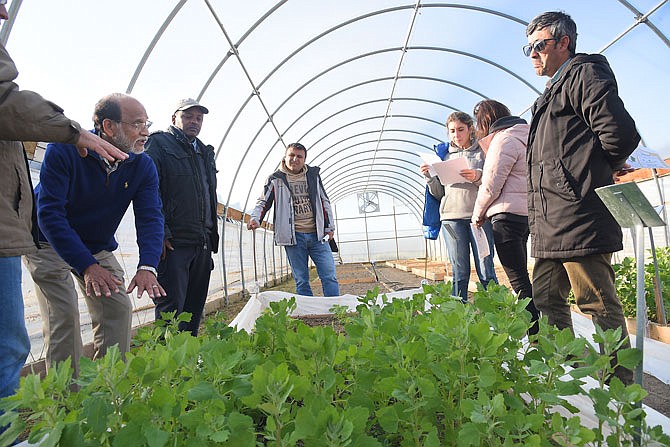The sound of running water echoed off the walls of the Lincoln University George Washington Carver Farm on Thursday afternoon as Zohra Mammadova and Fatima Abdullayeva craned their necks to look at the small fish in large containers at the fish hatchery.
Mammadova and Abdullayeva are part of a delegation from Azerbaijan, hosted by the Jefferson City Rotary Clubs, that is visiting the Capital City this week to study Mid-Missouri agriculture and learn about American culture.
The delegation - consisting of five delegates, a facilitator and interpreter - arrived in Jefferson City late last week as part of the Open World Leadership Center, an agency of U.S. Congress that tries to establish "mutually beneficial relationships" between future leaders of different countries, according to the organization's website.
The Open World Leadership Center offers a U.S. exchange program to post-Soviet era countries like Azerbaijan, Kazakhstan, Moldova, Russia and Ukraine. The exchanges can center around various topics like agriculture, human-trafficking prevention, government and court transparency and nuclear nonproliferation, according to the organization's website.
The delegation studied climate-smart agriculture in Mid-Missouri by meeting with local and state officials and touring various Mid-Missouri farms and wineries to learn about soil health, water resources and conservation, among other items.
At the Carver Farm, there are various plant science, aquaculture, and animal science research and demonstrations conducted, many of which the delegates could see, said Ruth Canada, director of auxiliary and engagement for the College of Agriculture at LU.
Abdullayeva served as the facilitator for the delegation and currently works at the United States Agency of International Development in Azerbaijan. She said this exchange program is valuable because young professionals can gain more knowledge they could use to improve their countries.
"We don't have maybe all of this equipment and these techniques, what we've seen," she said. "These are things they need for their future, for professional development, to grow and bring mostly that experience and that knowledge and share with people in their country."
Before walking the farm Thursday afternoon, the delegates spent most of the morning listening to local scientists present about Midwest agriculture, covering topics like organic farming, as well as quinoa and hemp production.
Working at the World Bank & Ministry of Agriculture in Azerbaijan, Mammadova said she strives to implement different programs for youths and farmers. She said she was extremely interested in 4-H programs many local schools offer and she would love to see a similar program carried out in her country.
"It's very interesting for us because it's amazing for us to see the agriculture of Missouri and how they do a lot and how their system works and the government's support," Mammadova said.
Learning is a two-way street, though.
Jim Wetzel, LU aquaculture program coordinator, gave the delegates a tour of the fish hatchery at the Carver Farm, and he said he sometimes gets more information from the delegates than they do from him.
"I'm getting a feel for how they do things, and it might help me with some ideas if I know they are doing the same thing," he said. "They're seeing some of the things we do that may or may not work, and they'll probably take some of those ideas back, and they might test them. That speeds everybody's abilities to improve in terms of raising food and other things like that."
The learning didn't stop at agriculture as many delegates said they learned about American culture and traditions while on the trip, too. Abdullayeva and several delegates added they appreciate their host families, who have helped them better understand the culture and give them tours of the Capital City.
Canada said Lincoln University was excited to host the delegates Thursday, adding the newcomers seem interested and brought different levels of expertise. The delegation also visited another LU farm, Alan T. Busby Farm, at 5124 Goller Road, earlier this week.
"Missouri is such an agriculture-heavy state, and I don't think people understand the impact Lincoln University has on the state, so by bringing the delegates in, it shows we have something to contribute, not only to Missouri but to the world," she said.
The Jefferson City Breakfast Rotary Club wanted to do an exchange of sorts and thought the Open World Leadership Center's U.S. exchange would work out well, club President Julia Prullage said, adding the exchange so far has been a success.
"They are so much fun, and they are so high-energy," she said. "They're so curious about our cities, our country, our culture, our education system."
The club plans to participate in another exchange through the Open World Leadership Center, Prullage said, but she was not sure when that would be.
The delegates plan to leave Mid-Missouri on Saturday.

